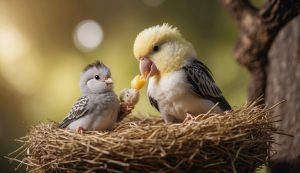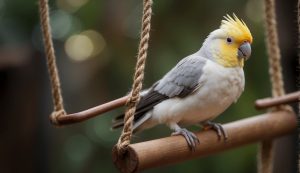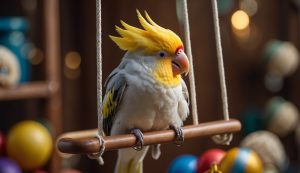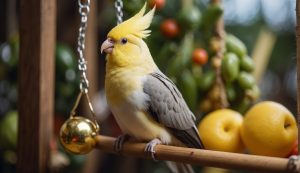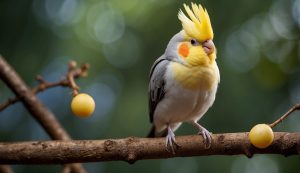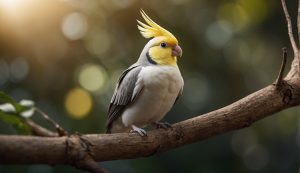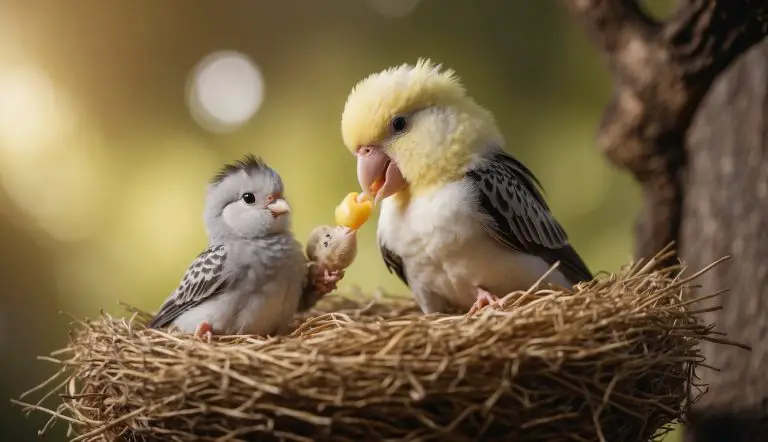How to Care for a Pregnant Cockatiel: Essential Tips for a Healthy Brooding Period

Caring for a pregnant cockatiel involves a blend of attentiveness and understanding of their specific needs.
Throughout the gestation period, it’s crucial to provide an environment that is safe, quiet, and comfortable to ensure the health of both the mother and her babies. It is important to monitor the cockatiel’s diet, making sure it’s rich in calcium and vitamin D to support egg development.
Additionally, because cockatiels can become more territorial when nesting, it’s important to respect their space and reduce stressors in their environment.

Creating a nurturing environment requires some modifications to their usual care routine. This might include adjusting the location of the cage to a low-traffic area, ensuring consistent daylight cycles, and maintaining a warm temperature in the room. Nesting materials should be provided to allow the bird to prepare for the arrival of her chicks. Gentle interactions and regular, quiet times can help in keeping the mother bird calm during this significant phase.
Key Points
- Providing a nutritious diet is essential for a pregnant cockatiel.
- Adjusting their environment can help minimize stress during pregnancy.
- Respectful and gentle care is crucial for the well-being of a pregnant cockatiel.
Table of Contents
Cockatiel Pregnancy – The Basics
When I care for my female cockatiel during her breeding season, I pay close attention to several signs that indicate she’s preparing to lay eggs. These signs are crucial for providing her with the right care.
Firstly, behavioral changes are common. She might seem more protective of her cage or space, and she may start shredding paper or other materials to make a nest. This nesting behavior is a clear sign that egg laying might occur soon.
In terms of physical signs, my female cockatiel’s belly may appear slightly larger due to the eggs developing inside her. The area near her vent becomes more swollen and red as the time for egg laying approaches. It’s critical not to stress her during this time, as a relaxed environment is essential for a healthy egg-laying process.
-
Laying Schedule: Cockatiels will typically lay one egg every other day until their clutch is complete, usually containing 4 to 6 eggs.
-
Incubation: After the last egg is laid, my cockatiel will begin to incubate them, and I ensure the nesting area is undisturbed. Incubation lasts about 18 to 21 days before the chicks hatch.
During this period, it’s my job to provide an enriched diet that is high in calcium to promote good eggshell formation and support the female’s health. Cuttlebone or a calcium supplement can be provided.
By keeping a close eye on her behavior and physical condition, I can help my female cockatiel have a smooth and successful breeding experience. Remember, while cockatiels don’t technically get “pregnant” as mammals do, the egg-laying process can still be demanding on their bodies, so gentle care is paramount.
Creating a Supportive Environment
In my experience caring for a pregnant cockatiel, building a supportive environment is crucial. It includes providing a clean and spacious cage, offering a nutritious diet, ensuring gentle handling, and maintaining their health and wellness.
Cage Setup and Size
Size: I always ensure the cage is large enough to move comfortably. The cage should be at least 24 inches wide, 24 inches deep, and 30 inches tall.
- Nesting Box: A nesting box should be large enough for the cockatiel to sit and turn around in comfortably. I typically use a wooden box sized around 12x12x12 inches.
- Cleanliness: I keep the cage and accessories clean to prevent infections. Daily cleaning of food and water dishes is essential.
- Accessories: I provide several perches at different levels and soft nesting materials. Avoid placing perches directly above the food or water to keep them clean.
- Toys and Enrichment: Toys and other forms of enrichment are important for mental stimulation.
Dietary Considerations
Calcium and Vitamins: A pregnant cockatiel requires additional calcium. I provide cuttlebone and a mineral block to support eggshell formation.
- Nutritious Diet: I ensure the diet includes a mix of pellets, seeds, and fresh vegetables and fruits. Calcium-rich foods like broccoli are vital.
- Fresh Water: I replace the water daily to ensure it is always fresh.
- Food Placement: I place the food and water dishes in an accessible location, ensuring the cockatiel doesn’t have to strain to reach them.
Behavior and Handling
Change in Behavior: I keep an eye out for hormonal changes that might affect their behavior. Cockatiels can become more protective or even aggressive.
- Handling: I reduce handling to avoid unnecessary stress. When I do handle my cockatiel, I am extra gentle.
- Privacy: I respect their need for privacy, especially in the nesting area.
Healthcare and Wellness
Veterinarian Visits: I schedule regular veterinarian visits to monitor the cockatiel’s health and the progress of the pregnancy.
- Observation: I watch for signs of illness such as changes in weight, swollen abdomen, or a decrease in activity.
- Drafts: I keep the cage away from drafts and ensure a stable temperature.
- Cleaning: Regular cleaning of the cage and accessories is important, but I am careful with the nesting area to avoid disturbing my cockatiel.
Frequently Asked Questions
Caring for a pregnant cockatiel requires specific knowledge to ensure their health and the well-being of the future chicks. I’ll help answer some common concerns for you.
What should be included in the diet of a nesting cockatiel?
Nesting cockatiels benefit from a fortified diet that includes high-calcium foods, like cuttlebone or calcium supplements, and a variety of fresh vegetables and fruits. Protein sources such as boiled eggs can also be offered to support the extra nutritional needs.
How can you ensure a healthy environment for cockatiel egg incubation?
To ensure a healthy environment, keep the nesting area at a stable temperature and humidity level, and provide a quiet, stress-free space. Cleanliness is essential, so regularly clean and disinfect the nest and surrounding areas.
What are the signs of a healthy cockatiel pregnancy?
A healthy cockatiel pregnancy is indicated by the bird’s regular eating and nesting behavior, smooth and rounded abdomen, and active preparation of the nest. The cockatiel should appear comfortable and not distressed.
How do you care for a cockatiel after it lays eggs?
After laying eggs, ensure that your cockatiel has continuous access to a nutritionally balanced diet and fresh water. Minimize stress and environmental disturbances to allow for proper brooding.
At what age is it safe for cockatiels to start breeding?
Cockatiels should be at least 18 months to 2 years old before they start breeding. This allows them to reach full maturity and helps ensure the health of both the parents and the offspring.
How many eggs does a cockatiel typically lay in a clutch?
A cockatiel typically lays between 4 to 6 eggs per clutch. Eggs are usually laid every other day until the clutch is complete, and not all of the eggs may hatch.

